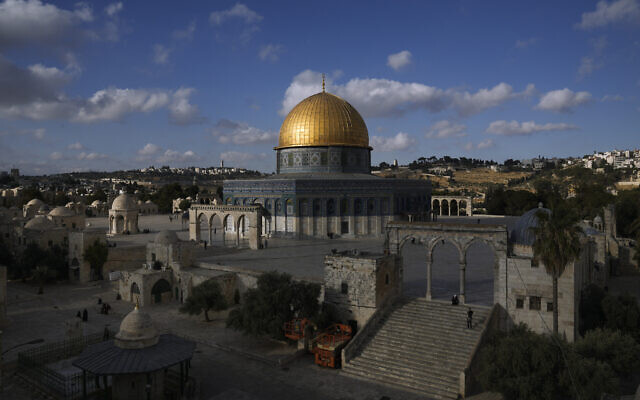The Central Bank of Jordan unveiled a new 50 dinar banknote featuring an image of King Abdullah II with the Temple Mount compound in East Jerusalem in the background, as part of the monarchy’s new set of banknotes in Jordanian currency going into wide circulation in the coming months.
The bank put forth new designs for banknotes in denominations of 1, 5, 10, 20, and 50 Jordanian dinars and began circulating some of the new bills late last month. Previously, the 20 Jordanian dinar note featured the Dome of the Rock shrine, housed on the flashpoint Temple Mount site alongside the Al-Aqsa Mosque, with an image of King Hussein on the front.
The new 20-dinar bill also features the late monarch but without the Temple Mount site, a source of uneasy tensions in recent months as the new Israeli government headed by Benjamin Netanyahu has taken shape.
The nascent coalition features Itamar Ben Gvir, a far-right party leader and newly minted national security minister, who has made several trips to the Temple Mount as a Knesset member and was also a leader of a contentious nationalist march through the Muslim Quarter in Jerusalem’s Old City. On several occasions, he set up an ad hoc office in East Jerusalem’s Sheikh Jarrah neighborhood, which has also been at the center of Israeli-Palestinian tensions.
The Temple Mount is revered by Jews as the historic location of the two Jewish Temples, making it Judaism’s holiest site. It is also the third-holiest for Muslims, who refer to it as the Al-Aqsa Mosque compound or the Noble Sanctuary. Many Palestinians reject the notion that the site is holy to Jews, having accused Israel and Zionists for around a century of plotting to destroy the mosque and replace it with a Jewish temple — a move that is not supported by mainstream Israeli society.
Israel captured the Temple Mount and Jerusalem’s Old City from Jordan in the 1967 Six Day War, almost two decades after Amman conquered it during the War of Independence in 1948. However, Israel allowed the Jordanian Waqf to continue to maintain religious authority atop the mount.
Alleged provocations and violence at the site have frequently turned into wider conflagrations.
On Tuesday, despite reports he would delay, Ben Gvir paid a visit to the site, his first as minister, in a move that was widely denounced by Israel’s allies including the US, the UK, France, Egypt, Turkey, and the United Arab Emirates, as well as by the opposition headed by former premier Yair Lapid.
National Security Minister Itamar Ben Gvir visits the Temple Mount, January 3, 2023. (Courtesy Minhelet Har Habayit)
Jordan, which views itself as a custodian of the Temple Mount — a status Israel does not recognize, though it acknowledged the kingdom’s “special role” at the site in the countries’ 1994 peace treaty — castigated Israel over the far-right minister’s visit and accused him of “storming”the site.
After the visit, Israel’s ambassador to Jordan, Eitan Surkis, was called into Jordan’s Foreign Ministry offices for a dressing-down, according to Hebrew media reports. Surkis told the Jordanians that Israel remained committed to the status quo, that there had not been any violations of the agreement and that Israeli ministers have visited the site in the past.
Ben Gvir has long been an advocate of formally altering the Temple Mount status quo, in which Muslims are allowed to pray and enter with few restrictions, and Jews can visit only during limited time slots via a single gate and walk on a predetermined route, closely accompanied by police. Jews are not allowed to pray at the site, though recent years have increasingly seen police allow some silent prayer.

A view of the Dome of the Rock shrine at the Al Aqsa Mosque compound in Jerusalem’s Old City, June 21, 2022. (AP Photo/Mahmoud Illean, File)
Palestinians and most of the international community vehemently reject any changes to the current situation, although most Palestinians also object to any Israeli Jewish presence at the site, including of police officers tasked with preserving security.
Netanyahu has sought to assure Israel’s allies that he will not allow any changes, and he had a clause included in all of his coalition deals stipulating that the status quo “with regard to the holy places” will be preserved.
However, critics point to what they say has been the gradual erosion of the policy, with Jewish pilgrims often seen praying quietly at the site in recent years as Israeli police look on.
